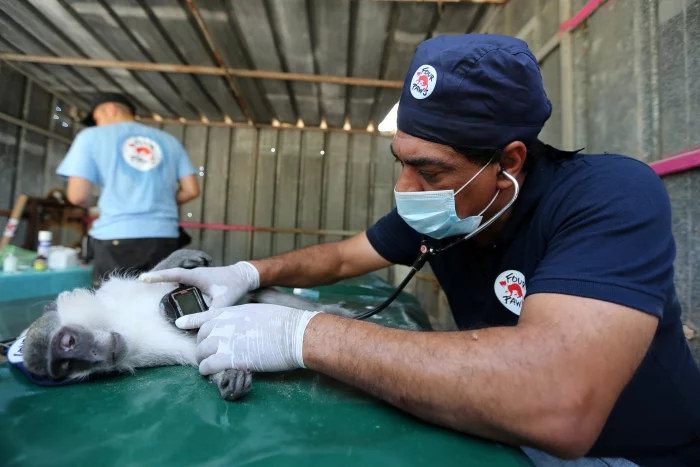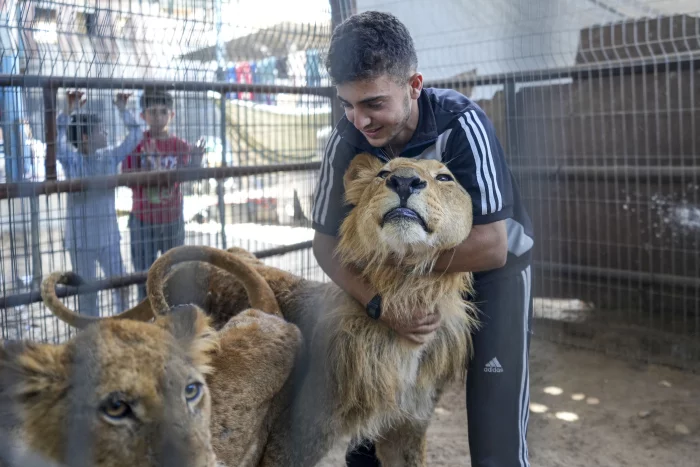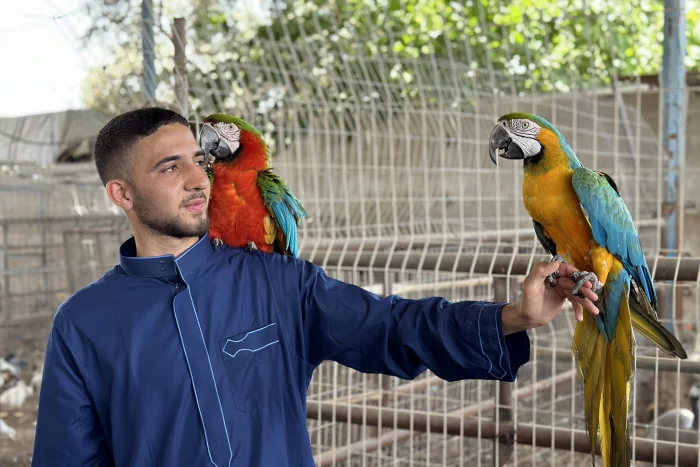KHAN YOUNIS, Gaza Strip — Amid the challenges of the Israeli invasion of Rafah last month, a heartwarming exodus took place, not just of nearly one million humans but also of beloved animals.
Fathi Jumaa, 60, the devoted owner of Rafah Zoo, courageously transported dozens of caged animals with him to Khan Younis, another war-affected city in Gaza.
In the urgency to evacuate, he had insufficient time and cages for all the animals. Consequently, he released dogs, eagles, and exotic birds, while reluctantly leaving behind 12 turtles and three lions in Rafah, which has become an active combat zone, described by Israel as Hamas’ final stronghold.

“I am deeply worried about their fate. They will struggle without food or water,” Jumaa laments to NPR, knowing that amid the exodus of nearly 1.5 million residents, no one is able to monitor their condition.
Fathi Jumaa had previously reached out for help from international animal rescue groups at the onset of the war last October, reflecting the complex and sensitive dynamics surrounding Gaza’s zoos.
The conditions in Gaza’s zoos have deteriorated over the years due to repeated conflicts and economic hardships, making it increasingly challenging for zookeepers to provide adequate care for the animals.
Dr. Amir Khalil, a Vienna-based veterinarian leading animal rescue missions for Four Paws, has made numerous visits to Gaza over the past decade, engaging in delicate negotiations with both Israeli and Hamas authorities to facilitate animal evacuations from war-torn areas.
In 2014, Khalil successfully evacuated three lions and several birds with injured wings from the Al-Bisan zoo in north Gaza during a 50-day conflict between Hamas and Israel. The danger posed not only to the animals but also to civilians surrounding the zoo underscored the urgency of the rescue missions.
Subsequently, in 2016, Four Paws intervened to rescue animals from the Khan Younis zoo, dubbed “the worst zoo in the world” at the time due to its distressing display of mummified animal corpses resulting from neglect.
The last time Dr. Khalil visited Gaza was five years ago to evacuate animals from Fathi Jumaa’s Rafah Zoo, which had been referred to by Four Paws as “the zoo of sorrows.” The deteriorating condition of the animals, including a lioness subjected to brutal claw removal, shocked the organization.
After tense negotiations involving Israeli authorities and Hamas in 2019, Four Paws successfully evacuated 47 of Jumaa’s animals, compensating him for the costs incurred and obtaining his commitment not to reopen Rafah Zoo. Despite this agreement, the zoo was reopened months later with new animals, leading to renewed concerns.
At the onset of the current conflict, Jumaa reached out to Four Paws once more for assistance in evacuating his animals and himself from Gaza. Although the organization declined to purchase the animals, it offered to facilitate their rescue if they could be brought near the border. Jumaa opted to remain in Rafah, a decision that now weighs heavily as conditions deteriorate.
Dr. Khalil emphasizes that animal rescues during wartime are an essential act of compassion, even amidst human suffering. He recalls instances where such efforts have bridged divides and brought fleeting moments of unity amid conflict.

While the fate of Jumaa’s lions left behind in Rafah remains uncertain, reports from north Gaza capture a baboon navigating the ruins, a poignant reminder of the broader impact of conflict on innocent lives.
Dr. Khalil, noting that animals transcend nationality and conflict, believes that their rescue can symbolize gestures of kindness and compassion amidst strife. He envisions a future where animals serve as catalysts for peace, transcending political boundaries and fostering empathy.
In Khan Younis, displaced from Rafah and amidst ongoing conflict, Jumaa and his family have set up temporary shelter next to the animals they managed to save. They endure challenges, including food shortages, yet remain steadfast in their commitment to caring for the surviving animals, a testament to their resilience and compassion.
